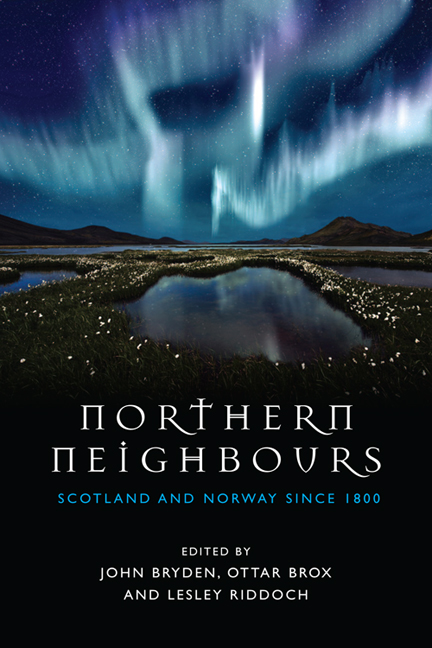Book contents
- Frontmatter
- Contents
- Acknowledgements
- Foreword
- 1 Introduction
- 2 Towards a Theory of Divergent Development
- 3 Cousins Divided? Development in and of Political Institutions in Scotland and Norway since 1814
- 4 Agrarian Change in Scotland and Norway: Agricultural Production, Structures, Politics and Policies since 1800
- 5 The Evolution of Local Government and Governance in Scotland and Norway
- 6 The Development of Industry and North Sea Oil in Scotland and Norway
- 7 Reflections on the Making of Norway
- 8 Money and Banking in Scotland and Norway
- 9 Religion in Scotland and Norway
- 10 The Nordic Welfare Model in Norway and Scotland
- 11 Access, Nature, Culture and the Great Outdoors – Norway and Scotland
- 12 Education in Norway and Scotland: Developing and Re-forming the Systems
- 13 Norway and the United Kingdom/Scotland after the Second World War
- 14 Conclusions
- The Contributors
- Bibliography
- Index
14 - Conclusions
Published online by Cambridge University Press: 05 August 2016
- Frontmatter
- Contents
- Acknowledgements
- Foreword
- 1 Introduction
- 2 Towards a Theory of Divergent Development
- 3 Cousins Divided? Development in and of Political Institutions in Scotland and Norway since 1814
- 4 Agrarian Change in Scotland and Norway: Agricultural Production, Structures, Politics and Policies since 1800
- 5 The Evolution of Local Government and Governance in Scotland and Norway
- 6 The Development of Industry and North Sea Oil in Scotland and Norway
- 7 Reflections on the Making of Norway
- 8 Money and Banking in Scotland and Norway
- 9 Religion in Scotland and Norway
- 10 The Nordic Welfare Model in Norway and Scotland
- 11 Access, Nature, Culture and the Great Outdoors – Norway and Scotland
- 12 Education in Norway and Scotland: Developing and Re-forming the Systems
- 13 Norway and the United Kingdom/Scotland after the Second World War
- 14 Conclusions
- The Contributors
- Bibliography
- Index
Summary
What do we finally draw from this comparison of Norway and Scotland over the past two hundred and more years? The evolution of public institutions and values, including what Adam Smith calls the ‘just rule of law’, seems to be a critical and fairly obvious factor: governments in democracies must ultimately be tested by the way that they manage a rather wide range of public and semi-public goods that they, and only they, can manage in the interests of the people that they are elected to represent. We are referring here in particular to the management of Polanyi's triad of natural resources, human beings and money, but also to education, health and the security of the individual. The goal of this management is deeply connected to the social contract that underpins the relations of people to the State and the notions of justice and equity that are linked to that. Only the State can guarantee such things, and the desired outcomes of freedom, equity and justice for all. The ‘market’ cannot do so, and nor can individuals acting alone.
Scotland's place within Britain and its globally dominant Empire during the first 150 years after 1800, and the hundred or so years before that, gave it a completely subordinate position in British politics within which, for most of the period, people were disenfranchised and the governments in Westminster neither secured people's interests in Scottish public goods, nor delivered freedom, equity and justice for all. The Scottish elite broadly went along with this because, being better motivated by greater poverty and better equipped by education, they were able to take considerable personal advantage from the British Empire, as capitalists, traders, military men, educators and administrators. But, as we see in Chapters 6, 7 and 8, the great wealth that was accumulated by the elite in this period did not filter down to the majority of workers who were less well paid, living in poor and unhealthy housing, and with lesser access to education when compared to their counterparts in Norway or indeed England. There was no government in Britain, and far less in Scotland, with the kind of representation given to Norwegians after 1814, while the Ancien Régime retained considerable direct and indirect political clout.
- Type
- Chapter
- Information
- Northern NeighboursScotland and Norway since 1800, pp. 282 - 286Publisher: Edinburgh University PressPrint publication year: 2015



